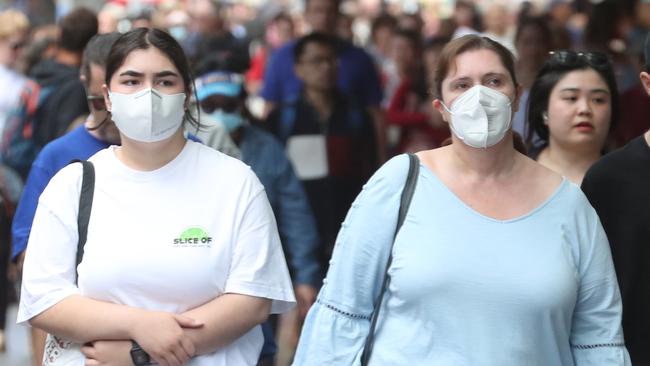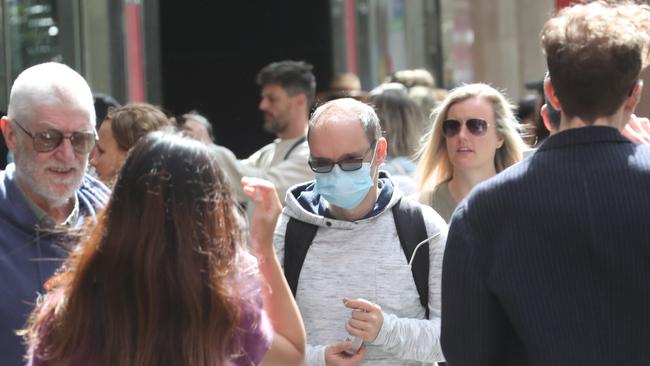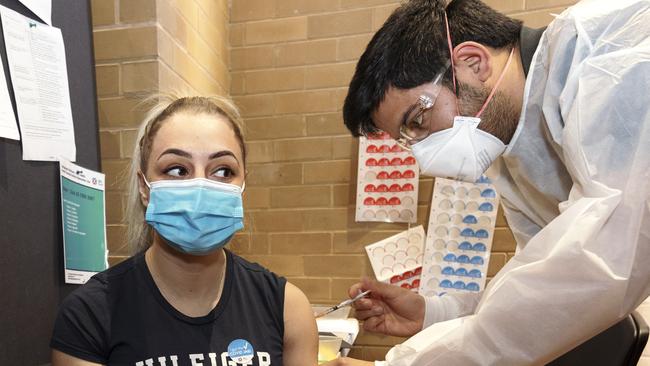Epidemiologist warns Aussies to increase vigilance as Covid grows ahead of flu season
An epidemiologist has warned Australians not to become complacent about Covid, with daily case averages doubling in the past three months.

An epidemiologist has warned Australians not to become too complacent about Covid-19 as the country is about to enter its fifth wave, with infection rates more than doubling in the past three months.
Compared to a rolling seven-day average of 2670 cases per day recorded on March 1, Australia’s Covid cases have increased to 5517 average daily cases as of May 30.
Vaccination rates have also fallen by 10,000 per week in the last three weeks, with nearly 65 per cent (16.6m) of the population not having had a Covid booster in the last six months.
With Australia about to enter its flu season, head of Melbourne University’s School of Health Sciences Bruce Thompson urged increased vigilance.

Pointing to World Health Organisation figures, which indicate more than 2600 Australia have died from Covid in 2023, the epidemiologist said the numbers were “significant”.
“2019 was a bad flu season and we had about 800 deaths, Covid is a more severe disease – the mortality is higher and for some high-risk groups, it’s more significant,” he said.
“We’re only six months into the year and we’ve had more than 2600 deaths from Covid – that’s frightening. We could potentially have more than 5500 deaths of Covid. That’s four or five times more than influenza.”
The potential for dual Covid and influenza infections can also increase the severity of both diseases, with older and immunocompromised people most at-risk.
“You can land yourself a couple or viruses at the same time, and that can just make you feel unwell,” Mr Thompson said.
“Each virus has a certain level of severity – whether you might go to hospital, or its mortality rate – and having another virus at the same time has an additive effect. It’s a new condition.”

While Prof Thompson said Australia, like the rest of the world, was now “living alongside the disease,” he advocated basic health principles like wearing a mask in high-risk conditions like airports, and staying home if sick.
He also advised people to think of the Covid booster like they do with an annual flu shot.
“We need a flu shot every year, it we needed a Covid shot every year, or twice a year, it is what it is,” he said.
“Take a bit more personal responsibility and awareness around not contracting Covid and not giving it to someone as well.
“Even though we are living alongside it, if you have Covid stay at home. The same goes, if you have a horrible cold. “
37,448 new cases recorded this week
With Covid figures on the rise, the majority of cases have been recorded in NSW and Victoria.
NSW recorded the highest number of new cases in the past week, with 13,480 people coming down with Covid-19 in the week leading up to June 2.
Victoria reported 8669 new cases in the past week, with 464 Victorians in hospital with Covid-19, an increase of 12 per cent from the week before.
COVID-19 weekly update – Friday 2 June 2023
— NSW Health (@NSWHealth) June 1, 2023
In the 7 days to 4pm Thursday 1 June:
• 13,480 positive test results were reported, including 8,831 positive rapid antigen tests (RATs) and 4,649 positive PCR tests.
• 64 deaths. pic.twitter.com/Vmatk2yyA4
Queensland recorded 777 average daily cases as of May 30, South Australia had 3728 new cases in the week up to June 2, and Western Australia flagged 3767 new infections.
The Northern Territory recorded 178 new cases this week, a slight drop from 203 the week before.
NSW Chief Health Officer Dr Kerry Chant again reiterated that people with symptoms should stay at home to avoid spreading the virus.
“Please don’t spread around your germs. Even if you have rapid antigen tests that are negative, please just stay at home,” she said.
“Please just do those simple measures that we’ve put in place for the past few years that we’ve learned so well as a community.”


